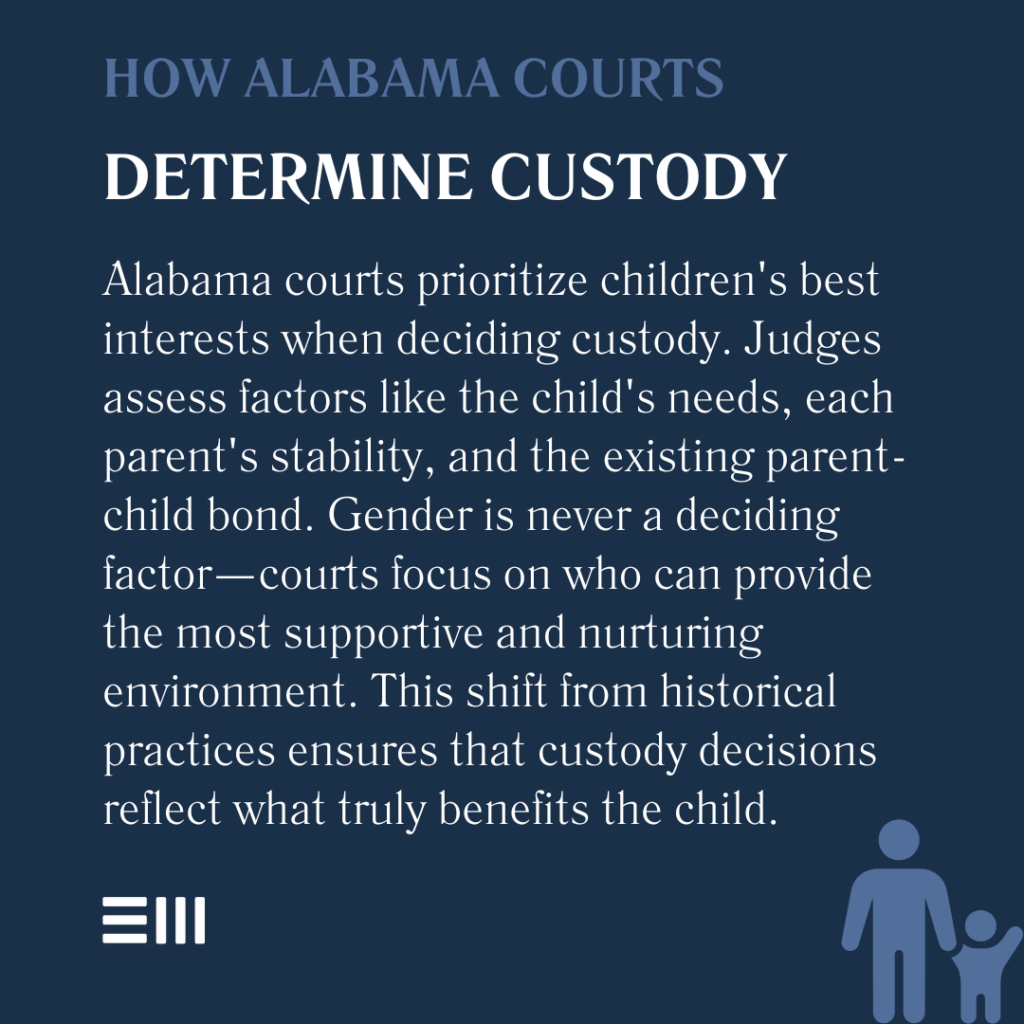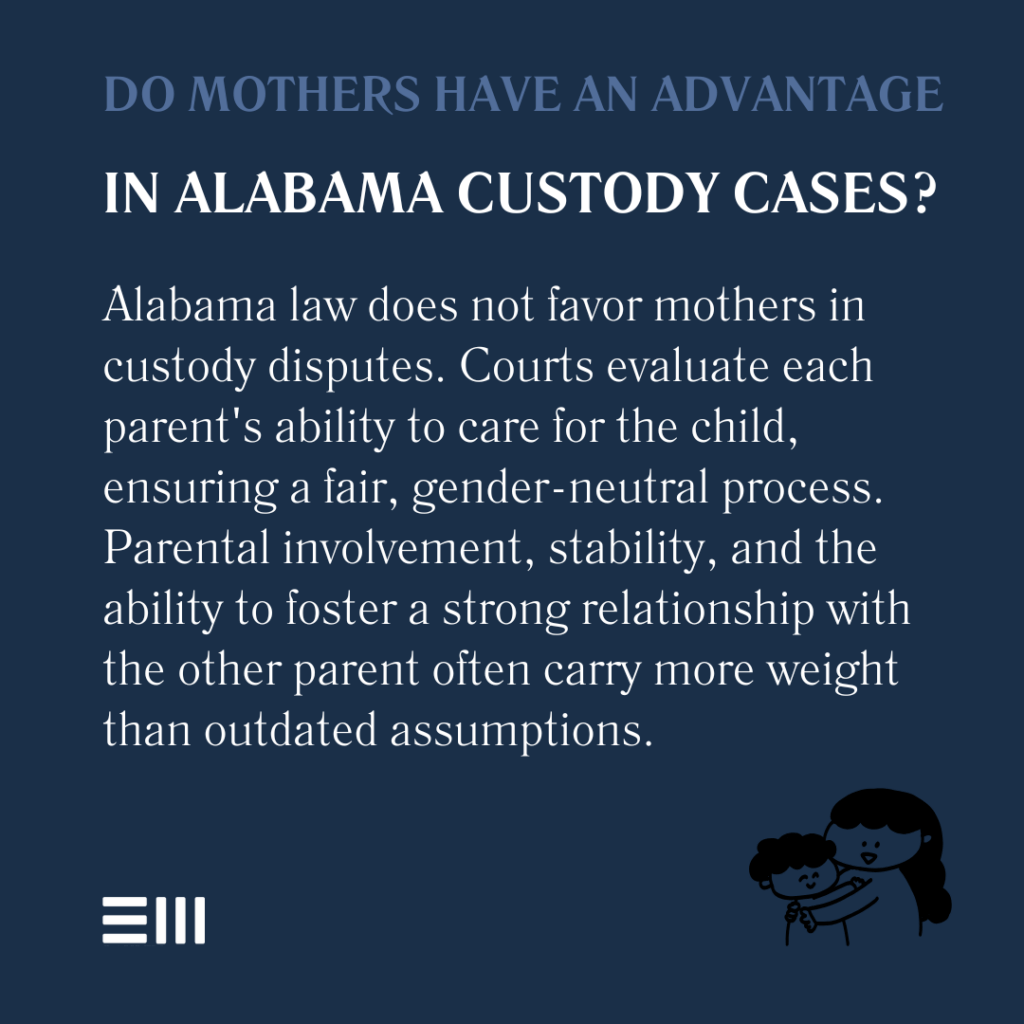
Alabama courts once automatically favored mothers in custody disputes, with 8 out of 10 mothers receiving primary custody before 1980 due to the “Tender Years” doctrine.
Today’s reality looks dramatically different. Alabama has evolved from traditional “mother state” presumptions to a gender-neutral approach emphasizing the best interests of children above all else.
How Alabama Courts Determine Custody
Alabama family courts evaluate multiple factors when determining custody arrangements, without gender-based preferences. The guiding principle remains the best interests of the child.
Judges carefully consider several key elements when making custody decisions:
- The emotional, social, moral, and educational needs of the child;
- The home environments offered by each parent;
- The age and physical/mental condition of the child;
- The character, stability, and mental health of each parent;
- The existing relationship between each parent and the child;
- Each parent’s ability to provide necessities and care;
- Recommendations from expert witnesses or court-appointed guardians;
- The child’s preferences (if old enough to express reasoned opinions); and
- Evidence of domestic violence or substance abuse.
The court’s ultimate goal is creating arrangements that support children’s wellbeing and development. This approach represents a significant shift from past practices where mothers received automatic preference.
Alabama law now explicitly recognizes that meaningful relationships with both parents generally benefit children’s development and emotional health whenever possible and appropriate.

Joint Custody vs. Sole Custody in Alabama
Alabama courts recognize different custody arrangements depending on family circumstances. Understanding these options helps parents navigate the legal process more effectively.
Joint custody and sole custody represent the primary arrangements available in Alabama:
- Joint Legal Custody: Both parents share decision-making authority regarding education, healthcare, religious upbringing, and other significant matters.
- Joint Physical Custody: The child lives with each parent for substantial periods, though not necessarily equal time.
- Sole Legal Custody: One parent holds exclusive decision-making authority.
- Sole Physical Custody: The child primarily resides with one parent while the other typically receives visitation rights.
Most Alabama courts now favor joint custody arrangements when appropriate, reflecting the understanding that children benefit from maintaining strong relationships with both parents. However, this preference doesn’t automatically determine outcomes in every case.
The specific custody arrangement ordered depends entirely on individual family circumstances and what arrangement best serves the child’s interests. Factors like parental cooperation, geographic proximity, and existing parent-child relationships significantly influence these determinations.
Do Mothers Have an Advantage in Alabama Custody Cases?
Alabama law explicitly states that courts cannot give preference based on gender alone. This represents a significant evolution from historical practices.
The Alabama courts now focus on:
- Parental fitness rather than gender stereotypes;
- Each parent’s demonstrated ability to meet children’s needs;
- The quality of relationships between children and each parent; and
- Evidence-based determinations rather than assumptions.
While some perception of maternal preference may persist in certain jurisdictions, official Alabama law mandates gender-neutral evaluation focused solely on children’s best interests.
Any judicial decisions based primarily on gender stereotypes rather than individual case facts may potentially be grounds for appeal.
Parents should understand that demonstrated parental involvement, stability, and ability to support children’s relationships with the other parent often influence custody determinations more than gender in today’s Alabama family courts.

Factors That Can Negatively Impact Custody Rights
Several behaviors and circumstances can significantly diminish a parent’s chances of obtaining favorable custody arrangements, regardless of gender.
Courts take these factors particularly seriously when evaluating parental fitness:
- Documented history of domestic violence or abuse;
- Substance abuse issues (alcohol or drugs);
- Criminal history, especially involving child endangerment;
- Abandonment or neglect of children;
- Interference with the other parent’s relationship with the child;
- Mental health issues that impact parenting ability;
- Unstable living conditions or frequent relocations;
- Failure to comply with court orders; and
- Demonstrated inability to meet children’s basic needs.
These factors apply equally to mothers and fathers in Alabama custody proceedings. Courts evaluate evidence of these issues to determine appropriate custody arrangements that protect children’s wellbeing and development.
Parents facing these challenges should address them proactively through appropriate treatment, counseling, or other interventions to improve their position in custody proceedings.
How Alabama Handles Child Support
Child support determinations in Alabama follow the “Income Shares Model,” which considers both parents’ incomes rather than automatically assigning responsibility to non-custodial parents.
The Alabama child support calculation process includes:
- Determining both parents’ gross incomes;
- Calculating the basic child support obligation based on combined income;
- Adjusting for healthcare and childcare expenses;
- Allocating responsibility proportionally based on each parent’s income percentage; and
- Considering extraordinary expenses or circumstances.
This approach reflects Alabama’s commitment to shared parental responsibility rather than gender-based assumptions. Both parents maintain financial obligations toward their children regardless of the custody arrangement.
The Alabama Department of Human Resources provides resources for establishing, modifying, and enforcing child support orders. Parents can access calculators and guidance to better understand potential support obligations.
Frequently Asked Questions About Child Custody in Alabama
Parents navigating custody matters in Alabama often have specific questions about their rights and responsibilities.
These answers address some of the most common concerns we encounter from Alabama parents.
Is Alabama Legally Considered a Mother State?
No, Alabama is not legally considered a “mother state.” Alabama law explicitly prohibits gender-based preferences in custody determinations. Courts must consider only factors relevant to children’s best interests without presumptions favoring either parent based on gender.
What Rights Do Unmarried Fathers Have in Alabama?
Unmarried fathers must establish paternity before asserting custody or visitation rights. Once paternity is legally established, unmarried fathers have the same rights as married fathers in custody proceedings. This typically involves either signing a voluntary acknowledgment of paternity or obtaining a court-ordered paternity test.
Can a Mother Deny Visitation if Child Support Isn’t Paid?
No. Child support and visitation are separate legal issues in Alabama. A custodial parent cannot legally withhold visitation due to unpaid support. Appropriate remedies for unpaid support include court enforcement actions rather than visitation interference, which could negatively impact the interfering parent’s custody rights.
At What Age Can Children Choose Which Parent to Live With?
Alabama law doesn’t specify a fixed age when children can choose their residence. Courts may consider the preferences of “children of sufficient age and maturity” (typically around 12-14 years), but this remains only one factor among many. The child’s preference never alone determines custody outcomes.
How Can I Modify an Existing Custody Order?
Custody modifications require demonstrating a material change in circumstances since the original order and showing that the requested change serves the child’s best interests. Examples include relocation, significant changes in parental circumstances, or evidence that current arrangements harm the child’s wellbeing.
Protect Your Family’s Future Today
Navigating Alabama’s family court system requires informed guidance from professionals who understand local court practices and precedents. The outcome of your custody case can impact your relationship with your children for years to come.
At Baxley Maniscalco, we’ve helped hundreds of Alabama parents establish custody arrangements that protect parent-child bonds while ensuring children’s needs remain paramount. Our experienced family law attorneys understand both the legal frameworks and the emotional complexities involved in these sensitive matters.
Contact Baxley Maniscalco today for a confidential consultation about your specific situation. Our dedicated team will help you understand your rights, develop a strategic approach, and advocate effectively for arrangements that serve both your children’s interests and your parental relationship.
Can't find what you're looking for? Search our site below.










